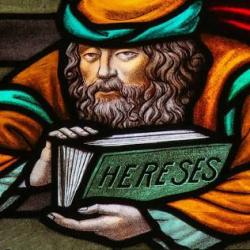In the midst of matches, I could talk with the Lord about how I was struggling with my forehand. We could talk strategy. I could ask for help to focus or concentrate when a particular fan was being distracting.
Press conferences are a great example. If I got a tough press question, I would ask the Lord for wisdom and guidance. I cannot explain how it happens, but the Spirit would give me the words to say, and it feels as though I'm just repeating the words as they're given to me. The answer would come out as something I would not normally say, but it came out eloquently and smoothly and I would marvel at what I just said. I can give countless examples.
You were known not only for your quickness, but for your tenacity on the court. Some of your most famous moments, including the match against Lendl in 1989, were moments of fighting back against overwhelming odds. Was your faith a part of that?
Absolutely. I often found myself in a situation where I was not the biggest and certainly not the strongest guy out there. But I would use the ability that God had given me. Part of that is playing with heart. My ability to be able to move around the court was certainly a strength of mine. But God has also given me an ability to fight. That can be used in my favor not only in the physical sense, but also for psychological advantage. If every player knows that I will chase down every ball, never give them a point, and never give up, they know that their work is cut out for them.
Sometimes I won matches before they even started, because my opponent wasn't willing to fight as much as I was. You can look at their faces before the match. It's hot, and they don't feel like playing. Or sometimes it's evident after the match starts, in a long rally, if they're not willing to fight for the point when they get weary. So, for me, without as many physical advantages, it was important to maintain that fighting spirit.
Ultimately, though, it came down to giving the Lord my best. If there's a ball that I can get, I will track it down as best as I can. I might not be able to hit the best shot, because I am not in position, but you never know when getting one more ball back will force an error. Sometimes the guy is surprised you reached it and made the shot -- but the most important thing is for him to know that whatever the situation, you are not going to give up.
You also earn people's respect. Sometimes Christian teenagers ask whether biblical teachings about being humble and merciful make it difficult for me to go out there and beat my opponent as badly as I can. Sports, I say, is a competition, and you are there to give the Lord your best. Unless you're competing against your mother, you should try to beat the guy on the opposite side of the net as badly as you can -- and, ironically, when you do that, you earn his respect.
John McEnroe is a good example. He's a great champion, and his demeanor can make him intimidating. But he will not give you respect as a player until you beat him. I remember playing Boris Becker, when I had lost to him twice before. We played a practice set prior to a tournament in Tokyo, and I beat him 6-4, 7-5. It was just practice, and afterward we came to the net to shake hands. He pulls me toward himself and looks me straight in the eye. "I just want to let you know that you got lucky." I thought, "Okay, Boris! This is just practice!" But he took it seriously because he didn't want you to gain a psychological edge.
We played in the semi-finals of that tournament. In my mind, I knew I had just beaten him, so I should be able to do it again. I did beat him in straight sets. So any kind of psychological advantage you can gain will work in your favor, and all the other players know it. If one player knows you will never give up, then everyone else knows too. If one player knows that you will throw in the towel and give up, then everyone will know. The locker room is small.
Let's talk about faith and ethnicity. I recently interviewed Jeremy Lin, an Asian-American who has the potential to be successful at the highest level. You were one of the first Asian-Americans to be successful at the highest level of your sport. Did you feel God's call upon you not only as a tennis player, but as an Asian-American tennis player? As someone who could break boundaries and inspire a new generation?
You have to embrace the situation God has placed you in. For me, it's important that I am able to witness to the Chinese people. I have a great heart for the people in China. But it's easier for me to relate to Chinese-Americans. I think it's fair to say that in the Asian-American community, because of the Asian heritage and the immigrant experience, it's common for parents to emphasize education for their children.





